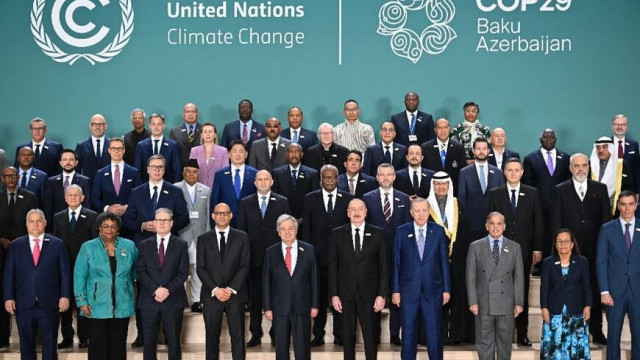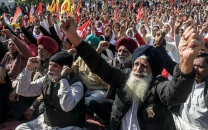$250b help offered to poorer nations
UN climate negotiations continue as proposal prompts demand for more money

Wealthy nations on Friday offered $250 billion a year to help poorer nations hit hardest by global warming but faced immediate calls led by Africa to give more as UN climate negotiations extended into overtime.
At the COP29 talks in Azerbaijan, developing nations are demanding a bigger commitment from historic polluters most responsible for warming, but rich countries insist that massive financial pledges are not politically realistic.
In a draft text revealed hours before two weeks of fraught bargaining were set to end, Azerbaijan said wealthy nations had committed to providing $250 billion a year by 2035.
The text also sets an ambitious overall target to raise at least $1.3 trillion per year by 2035 from not only developed countries but the private sector.
But a red line for many climate-imperilled nations at COP29 had been securing a new commitment from developed nations well above their existing pledge of $100 billion a year.
The new target "is totally unacceptable and inadequate", said Ali Mohamed, chair of the African Group of Negotiators.
"$250 billion will lead to unacceptable loss of life in Africa and around the world, and imperils the future of our world," he said.
The Alliance of Small Island Developing States, for which climate change is an existential threat, said the target showed "contempt for our vulnerable people".
But the United States signalled it was not looking to negotiate a higher figure. President-elect Donald Trump takes office in two months and is expected to pull the world's largest economy again out of climate diplomacy.
"It has been a significant lift over the past decade to meet the prior, smaller goal. $250 billion will require even more ambition and extraordinary reach," said a senior US official, whose team in Baku comes from outgoing President Joe Biden's administration.
Germany, a longtime leader on climate where elections are due next year, said any final deal was inevitable to include debt restructuring and other financial tools to raise the money, not just government money.
Europe wants to "live up to its responsibilities, but also in a way that it doesn't make promises it can't live up to", German Foreign Minister Annalena Baerbock told reporters.
COP29 lead negotiator Yalchin Rafiyev said negotiations would press on and that $250 billion "doesn't correspond to our fair and ambitious goal".
Activists point to studies that show that far more is needed for poor countries, which bear little responsibility but are disproportionately affected by record-high temperatures and rising disasters.
Jasper Inventor from Greenpeace called the $250 billion offer "inadequate, divorced from the reality of climate impacts and outrageously below the needs of developing countries".
But Avinash Persaud, special advisor on climate change to the president of the Inter-American Development Bank, said that the offer showed the talks were "within sight of a landing zone" for the first time. "There is no deal to come out of Baku that will not leave a bad taste in everyone's mouth," said the former advisor to Barbados Prime Minister Mia Mottley.



















COMMENTS
Comments are moderated and generally will be posted if they are on-topic and not abusive.
For more information, please see our Comments FAQ